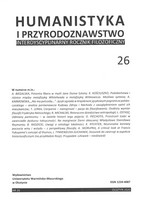POTENTIA LIBERA W MYŚLI JANA DUNSA SZKOTA
POTENTIA LIBERA IN JOHN DUNS STOCUS’S THOUGHT
Author(s): Agnieszka BiegalskaSubject(s): Social Philosophy, Philosophy of Middle Ages, 13th to 14th Centuries
Published by: Wydawnictwo Uniwersytetu Warmińsko-Mazurskiego w Olsztynie
Keywords: John Duns Scotus; scholastics; freedom; necessity; intellect; will; free will; love;
Summary/Abstract: John Duns Scotus was an original and sophisticated thinker (doctor subtilis) who lived and worked at the turn of the 13th and 14th century. His delving into human will and freedom broke up with the way those categories were understood by Ancient Greek philosophers, it went beyond the ideas by his scholastic predecessors, and it made a breakthrough in the European voluntarist thought. The article exposes three original voluntarist theses by Scotus: the first one – that the will is a form of dynamics which reaches its aim and fulfilment by itself and not by external objects; the second one – that the freedom originates from contingency of human existence and makes a crucial property of human being at the same time; the third one – that in the history of philosophy, there was no other thinker to abide by the thesis of unconditional autonomy of human will and freedom more radically than Scotus. That philosophical views on the issue of human freedom has been shown as Duns Scotus’s crucial and permanent share in our understanding of the human as it defined the basics of human autonomy as well as inalienable rights appertaining to humans.
Journal: Humanistyka i Przyrodoznawstwo
- Issue Year: 2020
- Issue No: 26
- Page Range: 7-20
- Page Count: 14
- Language: Polish

